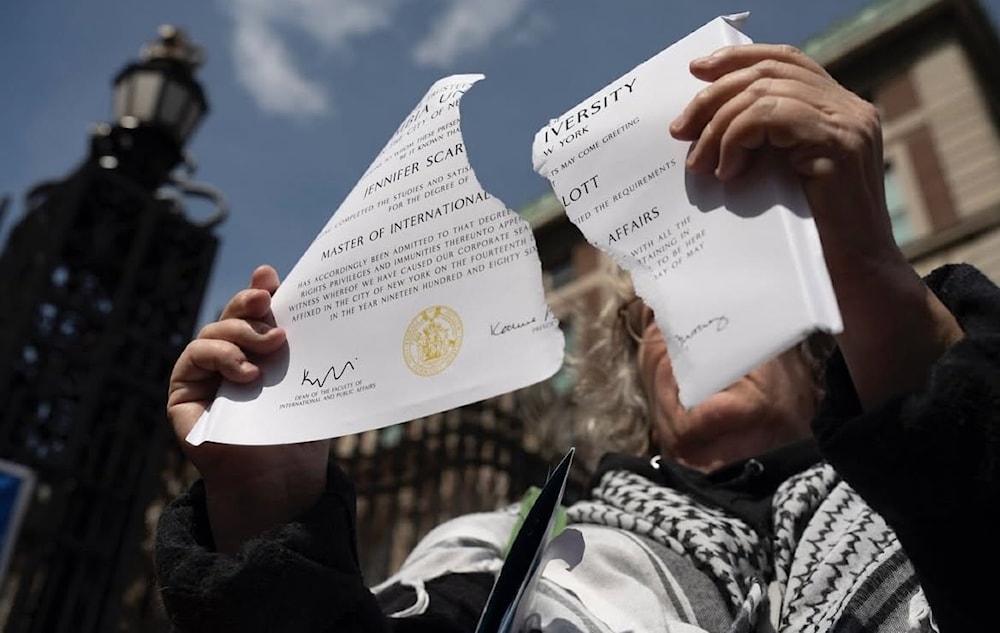Columbia Alumni tear diplomas in protest of school, leadership
Some students at Saturday’s protest expressed a loss of confidence in their university, citing the recent federal detention of a graduate student as part of the ongoing crackdown on pro-Palestinian activists in the US.
-

Columbia University alumni gathered to protest the kidnapping of Mahmoud Khalil, the collaboration between Columbia trustees and ICE, and the ongoing genocide in Gaza by ripping up their diplomas (Photos taken by Nina Berman/Social media)
Instead of participating in Columbia University’s annual Alumni Day for the School of International and Public Affairs (SIPA), a group of alumni gathered to publicly denounce the institution, tearing up their diplomas in protest, NBC News reported.
The demonstration was sparked by the recent detention of Mahmoud Khalil, a SIPA graduate student, Palestinian activist, and green card holder. Khalil was arrested on March 8 by Immigration and Customs Enforcement (ICE) agents at his university-owned apartment.
Organized by SIPA Alumni for Palestine, the protest featured speeches from alumni and current students, followed by chants and a collective destruction of diplomas.
“It’s not easy to do this, with none of us doing this lightly. There’s no joy in this,” said Amali Tower, a 2009 SIPA graduate who spoke at the protest.
Outside of @ColumbiaSIPA, Columbia University alumni gathered to protest the kidnapping of Mahmoud Khalil, the collaboration between Columbia trustees and ICE, and the ongoing genocide in Gaza. Alumni ripped up their diplomas. Photos taken by Nina Berman. pic.twitter.com/PiU5Wl4x24
— Layla 🪬 (@itslaylas) March 29, 2025
Tower, who has personally experienced displacement as an immigrant, emphasized the struggle she faced in earning her master’s degree at Columbia. “I’m not a proud alumni at all, and instead, I want to stand with the students, and I want to stand with Palestinians, and I want to stand with immigrants who are being rounded up and harassed, oppressed, and deported as we speak.”
Throughout the protest, demonstrators held signs and chanted “Free Palestine” and “Free Mahmoud Khalil.” Columbia University did not immediately respond to requests for comment.
Khalil’s detention and government response
Khalil’s legal team has confirmed that he is currently being held in a Louisiana detention facility.
The Trump administration has justified his arrest, stating that Khalil’s involvement in pro-Palestine campus protests poses a threat to US foreign policy. Secretary of State Marco Rubio made it clear that this is just the beginning of a broader crackdown, with Trump’s administration planning to target student visa holders who engage in similar activism.
“Once you’ve lost your visa, you’re no longer legal in the United States. And we have a right, like every country in the world, to remove you from our country,” Rubio stated this week.
He further explained the administration’s stance, saying, “If you apply for a visa to enter the United States and be a student, and you tell us that the reason why you’re coming to the United States is not just because you want to write op-eds, but because you want to participate in movements that are involved in doing things like vandalizing universities, harassing students, taking over buildings, creating a ruckus—we’re not going to give you a visa.”
Leadership turmoil at Columbia
Khalil’s detention comes amid a leadership shake-up at Columbia.
On Friday, the university announced that its interim president, Katrina Armstrong, had stepped down to return to her role at Columbia’s Irving Medical Center. Her departure follows the university’s decision to negotiate with the Trump administration over restoring its federal funding.
She has been replaced by Claire Shipman, co-chair of Columbia’s Board of Trustees, making her the university’s third president in less than a year. Shipman, a former White House correspondent for NBC News, CNN, and ABC News, previously testified before Congress about Columbia’s efforts to combat antisemitism.
However, protesters expressed skepticism about the leadership change.
Hannah, a 2024 alumna, who declined to provide her last name due to safety concerns, dismissed the significance of the transition. “It’s another figurehead that the Board of Trustees is going to use to do their bidding. I don’t think it matters,” she said, as quoted by NBC News.
She criticized previous university leaders, stating, “I think Minouche Shafik did an awful job. I think the interim President Armstrong did an awful job. I think Shipman is going to do an awful job because they’re not listening to their students. They’re listening to the Board of Trustees.”
Hannah also ripped up her diploma, explaining that her Jewish values compelled her to stand in solidarity with marginalized communities. “I’m here today because I’m Jewish, and my Jewish beliefs tell me to show up for communities that are being oppressed, that are being targeted,” she said.
Broader crackdown on student activists
Columbia is not the only university experiencing the detention of students. Federal authorities have also taken foreign-born students from Tufts University, Georgetown University, and the University of Minnesota into custody.
At the Columbia protest, some current students voiced fears about the climate on campus.
“Students are terrified to set foot on campus. I’m one of them, so just the fact that I’m here is scary because of the way that our colleagues have disappeared,” said Jasmine Sarryeh, a SIPA student pursuing a master’s in public affairs and a friend of Khalil’s.
She also questioned the value of a Columbia education in light of recent events.
“Columbia University used to be a bastion of freedom of speech and academic freedom, and it’s headed in a really dangerous direction,” she told NBC News.
Warning that the university risks compromising its core values, she added, “If they don’t start standing up for Mahmoud and all the protesters that were basically enacting their constitutional freedom of speech and right to freedom of assembly, that will set them down a very dark path that I hope the university doesn’t go down.”
Read more: Trump's pro-Palestine purge may bar foreign students: Axios

 5 Min Read
5 Min Read










